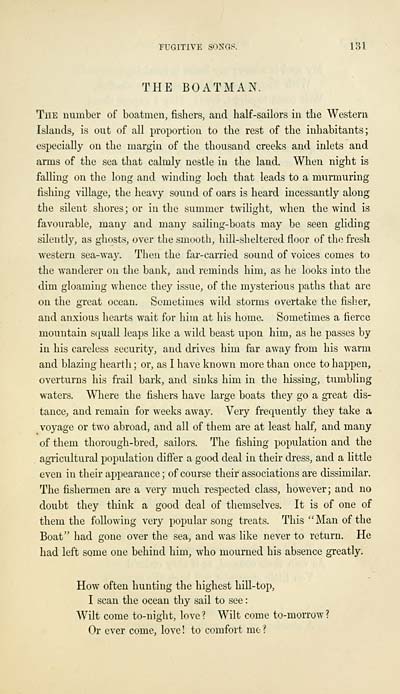Download files
Complete book:
Individual page:
Thumbnail gallery: Grid view | List view

FUGITIVE SONGi^. 131
THE BOATMAN.
The number of boatmen, fishers, and half-sailors in the Western
Islands, is out of all proportion to the rest of the inhabitants;
especially on the margin of the thousand creeks and inlets and
arms of the sea that calmly nestle in the land. When night is
falling on the long and winding loch that leads to a murmuring
fishing village, the heavy sound of oars is heard incessantly along
the silent shores; or in the summer twilight, when the wind is
favourable, many and many sailing-boats may be seen gliding
silently, as ghosts, over the smooth, hill-sheltered floor of the fresh
western sea-way. Then the far-carried sound of voices comes to
the wanderer on the bank, and reminds him, as he looks into the
dim gloaming whence they issue, of the mysterious paths that arc
on the great ocean. Sometimes wild storms overtake the fisher,
and anxious hearts wait for him at his home. Sometimes a fierce
mountain squall leaps like a wild beast upon him, as he passes by
in his careless security, and drives him far away from his warm
and blazing hearth ; or, as I have known more than once to happen,
overturns his frail bark, and sinks him in the hissing, tumbling
waters. Where the fishers have large boats they go a great dis-
tance, and remain for weeks away. Very frequently they take a
voyage or two abroad, and all of them are at least half, and many
of them thorough-bred, sailors. The fishing population and the
agricultural population differ a good deal in their dress, and a little
even in their appearance ; of course their associations are dissimilar.
The fishermen are a very much respected class, however; and no
doubt they think a good deal of themselves. It is of one of
them the following very popular song treats. This "Man of the
Boat" had gone over the sea, and was like never to return. He
had left some one behind him, who mourned his absence greatly.
How often hunting the highest hill-top,
I scan the ocean thy sail to see :
Wilt come to-night, love? Wilt come to-morrow?
Or ever come, love! to comfort me?
THE BOATMAN.
The number of boatmen, fishers, and half-sailors in the Western
Islands, is out of all proportion to the rest of the inhabitants;
especially on the margin of the thousand creeks and inlets and
arms of the sea that calmly nestle in the land. When night is
falling on the long and winding loch that leads to a murmuring
fishing village, the heavy sound of oars is heard incessantly along
the silent shores; or in the summer twilight, when the wind is
favourable, many and many sailing-boats may be seen gliding
silently, as ghosts, over the smooth, hill-sheltered floor of the fresh
western sea-way. Then the far-carried sound of voices comes to
the wanderer on the bank, and reminds him, as he looks into the
dim gloaming whence they issue, of the mysterious paths that arc
on the great ocean. Sometimes wild storms overtake the fisher,
and anxious hearts wait for him at his home. Sometimes a fierce
mountain squall leaps like a wild beast upon him, as he passes by
in his careless security, and drives him far away from his warm
and blazing hearth ; or, as I have known more than once to happen,
overturns his frail bark, and sinks him in the hissing, tumbling
waters. Where the fishers have large boats they go a great dis-
tance, and remain for weeks away. Very frequently they take a
voyage or two abroad, and all of them are at least half, and many
of them thorough-bred, sailors. The fishing population and the
agricultural population differ a good deal in their dress, and a little
even in their appearance ; of course their associations are dissimilar.
The fishermen are a very much respected class, however; and no
doubt they think a good deal of themselves. It is of one of
them the following very popular song treats. This "Man of the
Boat" had gone over the sea, and was like never to return. He
had left some one behind him, who mourned his absence greatly.
How often hunting the highest hill-top,
I scan the ocean thy sail to see :
Wilt come to-night, love? Wilt come to-morrow?
Or ever come, love! to comfort me?
Set display mode to: Large image | Transcription
Images and transcriptions on this page, including medium image downloads, may be used under the Creative Commons Attribution 4.0 International Licence unless otherwise stated. ![]()
| Early Gaelic Book Collections > Ossian Collection > Selections from the Gaelic bards > (155) |
|---|
| Permanent URL | https://digital.nls.uk/78071718 |
|---|
| Description | Selected books from the Ossian Collection of 327 volumes, originally assembled by J. Norman Methven of Perth. Different editions and translations of James MacPherson's epic poem 'Ossian', some with a map of the 'Kingdom of Connor'. Also secondary material relating to Ossianic poetry and the Ossian controversy. |
|---|
| Description | Selected items from five 'Special and Named Printed Collections'. Includes books in Gaelic and other Celtic languages, works about the Gaels, their languages, literature, culture and history. |
|---|

